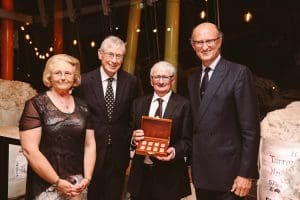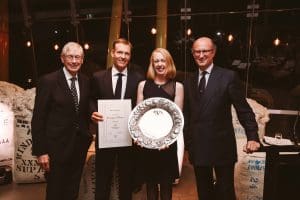
Zegna Vellus Aureum 2017 lineup, from left, Susan Rowbottom, ASWGA president Simon Cameron, David Rowbottom and Paolo Zegna. Picture – Karon Photography.
VICTORIAN ultrafine wool growers David and Susan Rowbottom have won the prestigious Ermenegildo Zegna Vellus Aureum Trophy for the fourth consecutive year.
Their win, with a 10.7 micron 1.1kg housed fleece from a 2.5-year-old Rowensville commercial wether, cements their position as consistent producers of some of the finest wool fleeces in the world.
But despite winning 500 grams of gold valued at about A$21,818 with the 2017 award, David is still disappointed ultrafine wool buyers seem reluctant to pay growers a profitable price to maintain or encourage production.
David said the gold they had won and banked from the Zegna awards over the past four years was “a very useful backstop” while ultrafine wool-growing was not very profitable.
“The industry is not very profitable and the housed end is not viable at the moment, and hasn’t been for about three years.
“We’re hanging in there, hoping it will come good – we believe it should because there are only four (housed wool) producers left in Australia,” he said.
“We can’t continue if it stays unviable.
“The higher wool prices over the past few months haven’t come through into the extreme finer end of the ultrafine industry,” David said.
“It is still very, very difficult to sell the wool at a price above your cost of production.
“You can sell it for around your direct cost of production, not including labour.”
David said housed ultrafine wool growers needed real market signals from processors as to whether they wanted to buy their wool at profitable prices.
“A$30,000 for a (100kg) bale of ultrafine wool is what we need to cover the cost of production, but you’ve got selling and labour costs, so you need a bit more.”
Ultrafine processors have paid more than $300 a kilogram for wool in the past, but current prices are about a half what is needed to make a profit on costs, he said.
The Rowbottoms’ fourth consecutive Vellus Aureum Trophy win at a ceremony in Melbourne last Friday night equalled the feat of the Hundy family from Pyramul in New South Wales. The Hundys won the award in 2010, 2011, 2012 and 2013.
The Rowensville victory was a close thing; the Rowbottoms’ fleece outscored the 11.7 micron entry from Andrew and Penny Hundy by just 0.07 points based on the “excellence of the fleece.” Walcha wool growers Ross and Rebecca Blake were third.
Last year the Rowbottoms won the award with a 9.9 micron fleece and the second-placed fleece had a mean fibre diameter of 9.8 microns.
“No-one seemed to be as fine this year.”
David Rowbottom said he was surprised to receive the Zegna award for the fourth time.
“It was tremendous feeling – we’ve been very very lucky to win it three times and I didn’t think it would happen again.
“It barely happened – 0.07 of one point is not much.”
NSW flock wins Zegna bale award

Zegna Superfine Trophy lineup, from left, ASWGA president Simon Cameron, David and Angie Waters, and Paolo Zegna. Picture – Karon Photography.
For the first time, Zegna this year requested bale entries for the ‘stronger’ Zegna Superfine Wool Trophy category and this award was won by David and Angie Waters from Tarrangower Merinos at Hillgrove New South Wales with a 110kg bale of 15 micron paddock-grown wool with a tensile strength of 48 Newtons/kilotex “straight off the grass” that was bought by Zegna at a 50 percent premium to market value, at about 2600c/kg greasy or $2860.
David Waters said ultrafine wool growers were generally not being paid enough for their wool.
“We could certainly have an inferior wool type and a higher micron and we wouldn’t receive any sort of a discount in price.
“In fact, I wouldn’t be surprised if a 17-18 micron wool grower was getting more – there is just a lot more demand for that currently.
“But if they keep cleaning the pipeline out like they are at the moment with the price rise that is on, I think supply and demand might hit equilibrium in the future,” he said.
“I’m very positive about where we are all headed.”
But Mr Waters said any fleece wool 16.5 microns and finer was not receiving any premium for diameter at the moment, with ultrafine wool prices not accelerating like the values for wool slightly stronger. He said many ultrafine growers were switching out of wool production towards prime lambs which would help the supply problem.
New South Wales also supplied the other superfine bale trophy placegetters, with Bigga ‘Creston Park’ growers Danny and Megan Picker second and Uralla ‘Queenlee’ producers Philip and Jennifer Carlon third.
David Rowbottom said bales for the superfine award had to be 14.5 microns and stronger.
“We only produced one bale (last season) that was stronger than 14.5 microns, it was 14.8 microns.
“Generally we are too fine for that competition.”
The Vellus Aureum competition was for shedded or paddock-grown fleeces of 13.9 microns or finer.

HAVE YOUR SAY